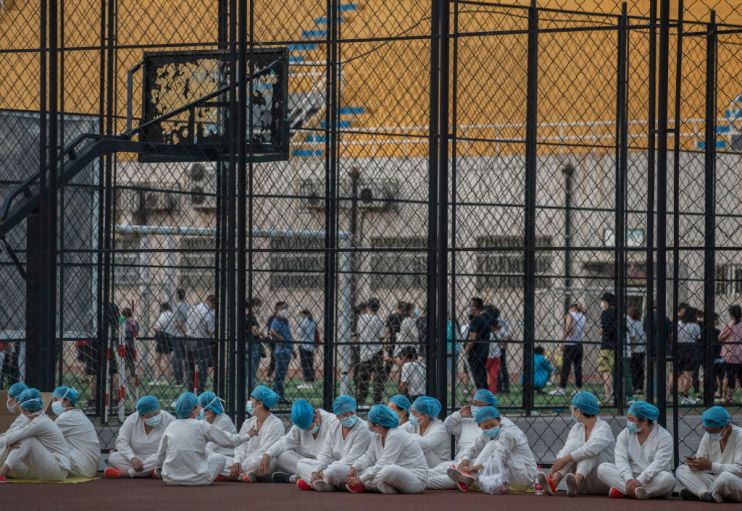Beijing tightens controls amid ‘extremely severe’ second wave fears

The Chinese capital of Beijing has put neighbourhoods under lockdown and upped testing in a bid to stop clusters of new coronavirus infection developing into a second wave.
Parts of Beijing were fenced off last night, with security checkpoints set up to prevent people from leaving the city as more than 100 new cases were diagnosed.
“The epidemic situation in the capital is extremely severe,” said Beijing city spokesman Xu Hejian at a press conference. “Right now we have to take strict measures to stop the spread of Covid-19.”
Where are the new cases?
The 106 new cases have been traced to a wholesale food market in south-west Beijing that rakes in thousands of visitors a day.
Local media reports said the virus was discovered on chopping boards used for imported salmon, prompting major Chinese supermarkets to pull all fish from their aisles. The market was shuttered over the weekend, and restrictions were placed on nearby neighbourhoods.
More than 8,000 market workers have now been tested and sent to centralised quarantine sites, and around 30,000 restaurants in the city have been professionally disinfected.
All indoor sports and entertainment venues in the capital were shut yesterday. Beijing’s Super League football team were tested and given the week off after their training camp was identified as close to the outbreak.
For more than seven weeks, Beijing’s robust track and trace system has been able to deal with sporadic new cases from people travelling to the city from abroad. Yesterday, the tracing system was used to contact 200,000 people who had visited the market since the end of May.
Nearly 200 testing sites have been set up in the capital, state news outlet Xinhua reported, and volunteers at security checkpoints are testing residents’ temperatures.
Shangai authorities have announced a 14-day quarantine for all arrivals into the country from medium and high-risk areas.
What have experts said?
New clusters are “always a concern”, said Mike Ryan, head of the World Health Organization’s emergencies programme.
“But what we do like to see is an immediate response to that and comprehensive set of measures,” he added.
Chinese officials and state media were quick to rebut claims that the outbreak marked a possible second wave.
“Control measures have been in place in communities [and] three officials accountable were dismissed,” said Hu Xijin, editor of China’s The Global Times. “US politicians will likely see a miracle that Beijing can have zero new cases in a month.”
Three officials were dismissed over the outbreak, including the head of the Xinfadi market. Previous dismissals of officials over outbreaks have sparked concern that it would encourage coverups of new clusters of infection.
Since coronavirus was first detected in the Chinese city of Wuhan last year, the country has reported more than 84,000 cases, including over 4,600 fatalities.
Health authorities have now entered “wartime mode” in a bid to prevent new cases from developing into a second wave, according to local media.
Asian stocks tumbled yesterday and oil prices slipped as second wave fears sent investors scurrying for safe-havens.
Before the Open: Get the jump on the markets with our early morning newsletter